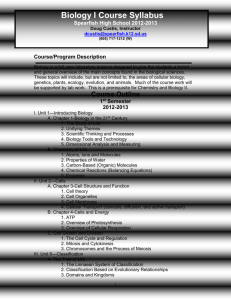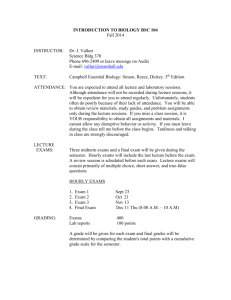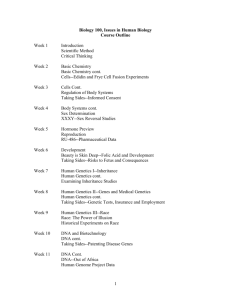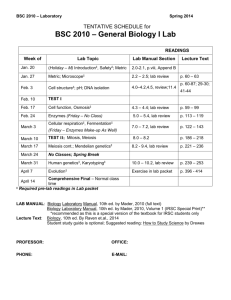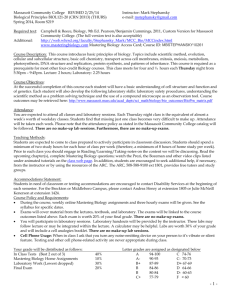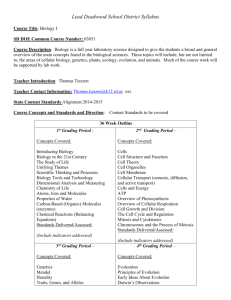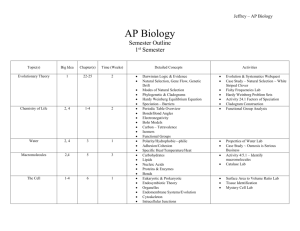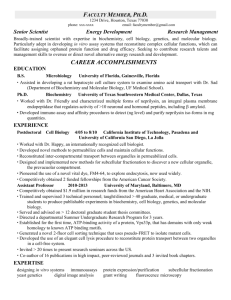Biology 1 – Survey of Biology with Lab
advertisement
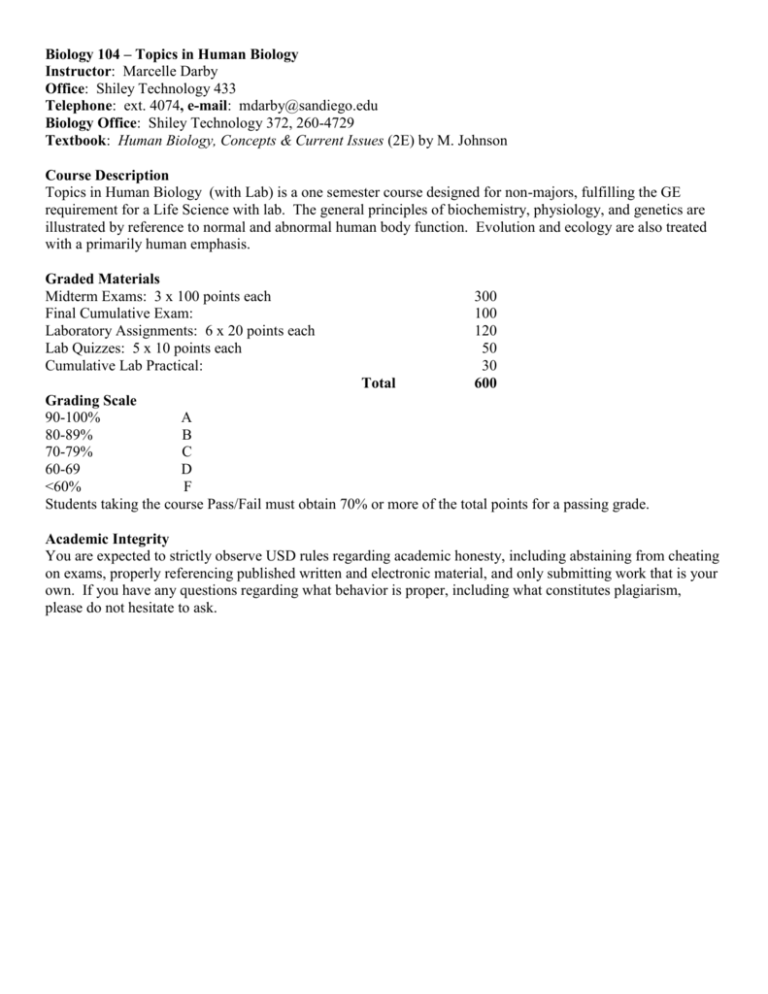
Biology 104 – Topics in Human Biology Instructor: Marcelle Darby Office: Shiley Technology 433 Telephone: ext. 4074, e-mail: mdarby@sandiego.edu Biology Office: Shiley Technology 372, 260-4729 Textbook: Human Biology, Concepts & Current Issues (2E) by M. Johnson Course Description Topics in Human Biology (with Lab) is a one semester course designed for non-majors, fulfilling the GE requirement for a Life Science with lab. The general principles of biochemistry, physiology, and genetics are illustrated by reference to normal and abnormal human body function. Evolution and ecology are also treated with a primarily human emphasis. Graded Materials Midterm Exams: 3 x 100 points each Final Cumulative Exam: Laboratory Assignments: 6 x 20 points each Lab Quizzes: 5 x 10 points each Cumulative Lab Practical: 300 100 120 50 30 600 Total Grading Scale 90-100% A 80-89% B 70-79% C 60-69 D <60% F Students taking the course Pass/Fail must obtain 70% or more of the total points for a passing grade. Academic Integrity You are expected to strictly observe USD rules regarding academic honesty, including abstaining from cheating on exams, properly referencing published written and electronic material, and only submitting work that is your own. If you have any questions regarding what behavior is proper, including what constitutes plagiarism, please do not hesitate to ask. Attendance , Make-up Policies, and Class Contribution Attendance for all six laboratory sessions is required for credit. There will be no make-up labs or quizzes. Attendance at all exams is also required. Exam Dates: February 18, March 24, April 28. If you miss an exam for a genuine emergency and can document the reason, I will allow you to take a make-up exam. Any make-up exam will be full essay format. Attendance in lecture is not required, but highly recommended. Faithful participation is expected in all lecture and lab sessions: your active involvement is the basis of this course and will be considered in making final grade determinations, particularly in borderline cases. Behaviors that count as positive contributions include: 1) answering questions asked by the teacher or other students; 2) asking questions about material being presented in class or material in the text; 3) making comments that might include relating a personal experience, sharing relevant content form another class, or responding to something another student said in class; 4) contributing within small groups toward the successful completion of tasks. Tips for Success Never miss a lecture. Read the text chapter before coming to lecture. Answer the questions at the end of each chapter and be sure you understand the listed terms and concepts. Give yourself time to learn. Rewrite your lecture notes as soon as possible after lecture. Review your lecture notes. Form a study group. Ask questions in class. Consider my office hours a tutoring session and use them to work with me before you fall behind. Lecture and Lab Schedule for Sections 3 and 4 Date 26-Jan 28-Jan 2-Feb 4-Feb 9-Feb 11-Feb 16-Feb 18-Feb 23-Feb 25-Feb 1-Mar 3-Mar 8-Mar 10-Mar 15-Mar 17-Mar 22-Mar 24-Mar 29-Mar 31-Mar 5-Apr 7-Apr 12-Apr 14-Apr 19-Apr 21-Apr 26-Apr 28-Apr 3-May 5-May 10-May 17-May Topic Lecture Characteristics of Living Things Properties of Water, Hydrogen Ions Macromolecules Macromolecules Macromolecules Cell Structure and Function Cell Structure and Function Exam 1 Passive & Active Transport Cellular Respiration Levels of Organization Levels of Organization Class Cancelled Skeletal System Spring Break Spring Break Muscular System Exam 2 Immune System Nervous System Endocrine Nutrition & Digestion Easter Monday Cell Reproduction & Differentiation Cell Reproduction & Differentiation Cancer Genetics Exam 3 Genetics Evolution Review Final Exam, 11:00-1:00, IPJ 218 Chapter Lab & Sect # Lab Topic 1 2 2 2 2 3 3 no Lab 1-3 Scientific Method, Microscopes 1-4 Scientific Method, Microscopes 2-3 Functions & Properties of Cells 2-4 Functions & Properties of Cells 3-3 Functions of Tissues & Organs I & II 3-4 Functions of Tissues & Organs I & II 4-3 Circulatory & Respiratory Systems 4-4 Circulatory & Respiratory Systems 5-3 Sensory 17 5-4 Sensory 17 18 19 6-3 Useful Applications of Genetics 3 3 4 4 5 6 9 11 12 6-4 19 22 Cumulative Final 7-3 & 4 Lab Practical, Field Trip: Museum of Man
